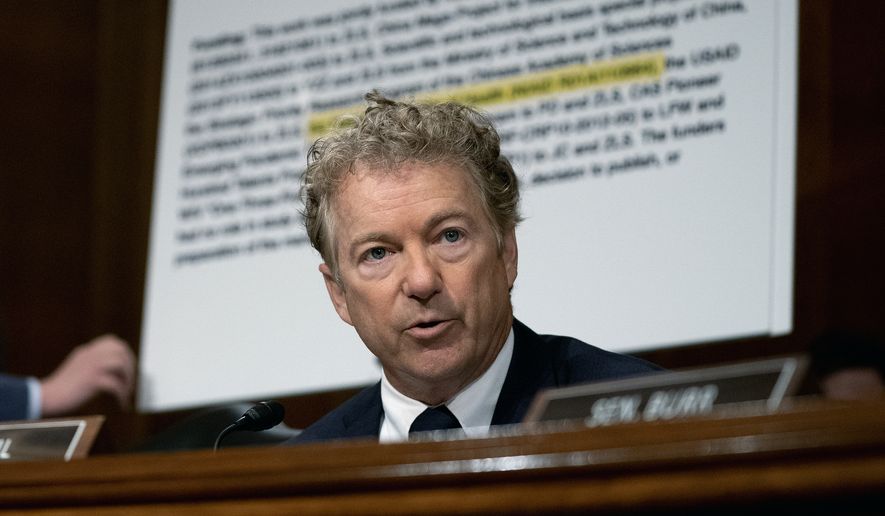WASHINGTON — The Senate voted overwhelmingly Wednesday to continue congressional authorization for the use of military force in the global fight against terror, turning back an effort by Kentucky Sen. Rand Paul to repeal the 2001 measure.
Senators rejected the amendment 86-9 as they are debating a separate repeal of two authorizations of military force in Iraq. There is broad bipartisan support to withdraw that congressional approval granted in 1991 and 2002 for military strikes against Saddam Hussein’s regime.
While those two authorizations are rarely used and focused on just one country, Iraq, the 2001 measure gave President George W. Bush broad authority for the invasion of Afghanistan and the fight against terrorism, approving force “against those nations, organizations, or persons” that planned or aided the Sept. 11, 2001, attacks on the United States.
Passed in October 2001, it is still used to this day to justify U.S. military action against terror groups — including al Qaeda and its affiliates, such as ISIS and al-Shabab — that are deemed to be a threat against America.
The 2002 measure that launched the invasion of Iraq 20 years ago this week has been used much less frequently, and supporters of repealing it say it is vulnerable to abuse. President Joe Biden has said he supports that repeal.
Senators in both parties said they might be open to eventually replacing the 2001 authorization for the war on terror and narrowing its authority, but they argued that it should not be fully repealed. “We have not yet had that substantive discussion,” said Senate Foreign Relations Committee Chairman Bob Menendez, D-N.J., ahead of the amendment vote.
Paul said that by repealing only the Iraq authorizations, Congress is “missing the point” since Hussein’s regime no longer exists. By leaving the 2001 measure in place, Congress is keeping the authorization that approves “war everywhere, all the time,” he said.
The Senate is expected to vote next week to repeal the two Iraq measures. In a test vote this week, 19 Republicans voted with Democrats to move forward on the legislation.
It’s unclear whether leaders in the Republican-controlled House will bring the bill up for a vote, even if it passes the Senate. Forty-nine House Republicans supported the legislation repealing the Iraq authorities when then-majority Democrats held a vote two years ago, but current House Speaker Kevin McCarthy, R-Calif., opposed it then.
McCarthy signaled this week that he is open to supporting the measure, but it’s unclear whether House Republicans will move the Senate bill without any changes. House Foreign Affairs Committee Chairman Michael McCaul, R-Texas, said he is interested in replacing the two Iraq authorizations instead of just repealing them, a move that is unlikely to have support in the Senate.
McCaul met with Senate Majority Leader Chuck Schumer, D-N.Y., on Wednesday on the authorizations of military force and other issues.
“I’m going to be for replacement,” he said coming out of that meeting. “I’ll see what the leadership does.”
Virginia Sen. Tim Kaine, the lead Democratic author of the Senate bill to repeal the Iraq authorizations, said he believes bipartisan support in the House could move votes. Noting McCarthy’s new openness, he said he views the House as “getting better and better every day” on the issue.
Kaine and Indiana Sen. Todd Young, the Indiana Republican who is also leading the push, have argued that repeal will help the United States’ strategic partnership with Iraq.
“That relationship I think is not lost on some of the members who were now willing to vote for repeal,” Kaine said.
• Associated Press writers Lisa Mascaro, Ellen Knickmeyer and Lolita Baldor contributed to this report.




Please read our comment policy before commenting.